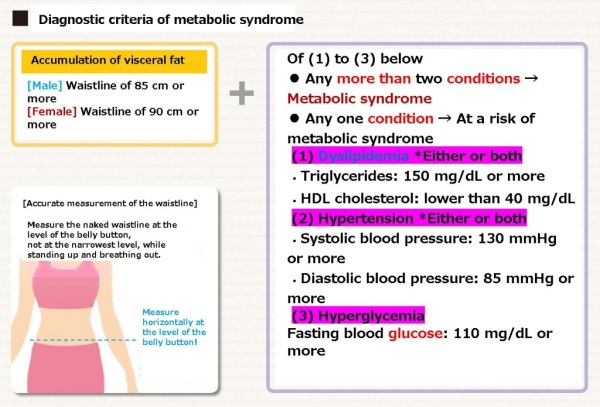Top > About Us > News Letter > Could you have metabolic syndrome?
Could you have metabolic syndrome?
Supervisor: Toshimasa Yamauchi, M.D. and Ph.D., Associate Professor, and Yoko Iizuka, M.D., Ph.D., Project Lecturer, Department of Diabetes and Metabolic Diseases
We assume that many middle-aged or aged people are worried about belly fat compared to when they were younger. How much do you know about metabolic syndrome, which is closely linked to obesity in middle-aged or aged people?
What is metabolic syndrome?
There are two types of obesity: visceral fat obesity, in which more fat is gained in the upper body by accumulating fat around internal organs in the belly; and subcutaneous fat obesity, in which more fat is gained in the lower body, mainly from the buttocks to the thighs, by accumulating fat in the tissue under the skin. Visceral fat obesity is largely connected to lifestyle-related diseases, such as diabetes. Accumulation of visceral fat triggers increased secretion of bad hormones and decreased secretion of good hormones, leading to a higher risk of lifestyle-related diseases, including impaired glucose tolerance, hypertension, and a lower level of good cholesterol, HDL. If you have more than two conditions of hyperglycemia, hypertension, or dyslipidemia in addition to having visceral fat obesity, you are diagnosed with “metabolic syndrome”.
Aren’t you underestimating metabolic syndrome?
If you have metabolic syndrome, you will be susceptible to the progression of atherosclerosis, and as a result, to serious diseases, such as myocardial infarction and stroke. The incidence of myocardial infarction in metabolic syndrome patients is about two times higher than that in people without metabolic syndrome. The more risk factors of metabolic syndrome, the higher the risk of heart diseases, including myocardial infarction. Besides diabetes, other diseases that are accompanied with obesity can be induced; therefore, the risk of cancer and sleep apnea syndrome will also be increased. Even if individual blood pressure or blood glucose values do not result in the diagnosis of disease, the risk from these factors can be accumulated on top of the risk from visceral fat obesity, leading to life-threatening diseases rapidly. This is why you must not underestimate metabolic syndrome.
If you are getting worried about metabolic syndrome
Take the specific health checkup (so-called metabolic syndrome examination) and specific counseling guidance, which are provided for an insured person and their dependents of 40 years old or older, and use them to prevent or improve metabolic syndrome. Because losing visceral fat and weight is required for the prevention and improvement of metabolic syndrome, a fundamental treatment is the modification of daily lifestyle. Reassess your diet and increase the amount of your exercise. Because smoking also increases the risk of metabolic syndrome, quit smoking.
Depending on their constitution, some people are more vulnerable to weight gain than are other people. If your weight is heavier now than when you were 20 years old, you may eat more or exercise less than your body requires. Of course, the risk of metabolic syndrome becomes higher with aging. If your current lifestyle is the same as when you were younger but your examination results are getting worse, you need to balance your diet and exercise.

Aim at losing 3 kg and 3 cm!
Losing visceral fat and weight can spontaneously decrease blood pressure or improve glucose tolerance without any other treatment, leading to the lower risk of metabolic syndrome. The Japan Society for the Study of Obesity recommends losing 3 kg in weight and reducing 3 cm from the waistline. Previous studies revealed that realizing this recommendation can indeed improve various examination results. If you are diagnosed with metabolic syndrome, firstly reassess your exercise and diet to aim at losing 3 kg and 3 cm.
